Berlin Alexanderplatz on Criterion DVD
07.12.07
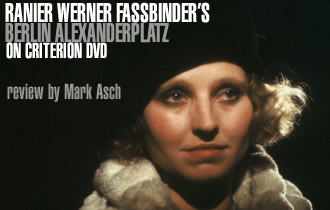 Berlin Alexanderplatz: A Review in 13 Chapters and an Epilogue
Berlin Alexanderplatz: A Review in 13 Chapters and an Epilogue
Chapter One.
“The Punishment Begins” is the title of the first episode of Rainer Werner Fassbinder’s fifteen-plus-hour miniseries Berlin Alexanderplatz (A Film in 13 Chapters and an Epilogue), made for German TV in 1980 and now reissued in a Criterion Collection DVD box so bricklike, it includes an entire 1931 feature film as a supplement. As in Alfred Döblin’s 1929 source novel, Franz Biberkopf (Günter Lamprecht) is protagonist and packhorse — freighting the narrative along, and bearing the whips of a driver outside his field of vision. In the opening scene, Biberkopf is released from prison, into a Weimar Berlin where it’s every man for himself and God against all.
Biberkopf is dismantled psychically by the state, materially by the economy, and spiritually by the friends who betray him over money or women. He takes a few beatings and hands a few out — including, in traumatic flashbacks boiling periodically to the surface, the manslaughter of his girlfriend, which led to his initial imprisonment. Biberkopf is variously a rapist, a lover, a pimp, and a john; a bum, an odd-jobber, and a criminal. The dominant decorative motif is a caged canary, and the most-referenced parable is Job’s. Here, a character will live hand-to-mouth even after losing an arm.
Chapter Two.
The forbidding late-career landscape of Berlin Alexanderplatz will be familiar territory for Fassbinder acolytes, accustomed as they are to the ravishing bile of his relentless oeuvre. In a sense, it’s a return to an ancestral home.
“My life would have turned out differently, certainly not as a whole, but in some respects, in many, perhaps more crucial respects than I can say at this point, differently from the way it turned out with Döblin’s Berlin Alexanderplatz embedded in my mind, my flesh, my body as a whole, and my soul,” Fassbinder wrote of the novel, which he first read in his early teens.
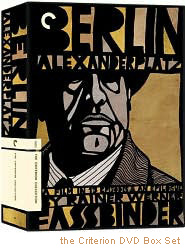
Chapter Three.
So the punishment began long before Fassbinder undertook Berlin Alexanderplatz, forty films into his career and two years before his death (a week and a half after his thirty-seventh birthday). And the film’s lesson — that society stands between us and our desires, which we can neither understand nor control anyway — was internalized and repackaged many times over, in products far less… punishing than this weekend-monopolizer.
Length, of course, has nothing to do with quintessence, but to talk around an object of such prominence — in Fassbinder’s biography, and in terms of sheer bulk — requires some irresponsible swerves. Berlin Alexanderplatz must be scaled because it, like Everest, is there. The climb can be brutal, but then, Fassbinder’s always appealed to the masochists.
Chapter Four.
The restored Berlin Alexanderplatz took its New York bow at the peak of a high season for cinephilia-as-questing masochism. It played at MoMA a month after the Museum of the Moving Image’s encore presentation of Jacques Rivette’s twelve-and-a-half-hour Out 1 (“the cinephile’s holy grail,” per critic Dennis Lim”), and after screenings, at Anthology Film Archives and the Brooklyn Academy of Music, of Bela Tarr’s seven-and-a-half-hour Satantango. We lined all three up, to see whose movie was longest. But, as at least one commentator pointed out, stomping over pullquotes about masochists and monuments, Berlin Alexanderplatz isn’t a movie, it’s a TV show (as is Out 1, for that matter), and maybe we shouldn’t make a mountain out of a miniseries. The installment plan was Fassbinder’s intended method of exhibition, or at least a compromise he made willingly, very early on. And don’t worry, one episode a week is just as emotionally tumultuous as a marathon viewing is physically exhausting.
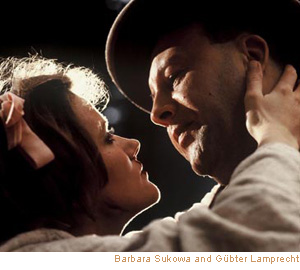
Chapter Five.
So Berlin Alexanderplatz is, like any TV show, episodic. One man’s cross-sectional societal odyssey, it is structured, especially in the first several hours, as a series of encounters. In the first episode, the editing (by Juliane Lorenz and Fassbinder, credited as “Franz Walsch”) hurriedly carries the newly freed Franz Biberkopf through a world teeming with strategies for living in it: superstition and folk wisdom (the prison guard who tells him that ex-cons who look back at the gates end up recidivists, and the Orthodox Jew who takes him in and relates the story of one of his heroes), as well as biology and medicine (a prostitute reads to him from a medical text, and he reads aloud from a prescription for an impotence drug.). In the second episode, Biberkopf has a dalliance with then-ascendant Nazism and meets up with fellow-travelers from his Communist days; in consecutive scenes midway through the series, he taunts a labor activist, then lectures a friend on the injustice of unequally distributed wealth.
Chapter Six.
This engagement of the common man with the firmament of ideas is one of the many things we define as Modernism; Döblin’s novel is most frequently compared with the polyphonies of Joyce and Dos Passos, whose books constitute maps of the world, with wildly varying degrees of intimacy and panorama. Throughout Biberkopf’s encounters, Fassbinder interrupts the action with intertitles and voiceovers (read by the director), juxtaposing the narrative with everything from Biblical passages to traffic reports.
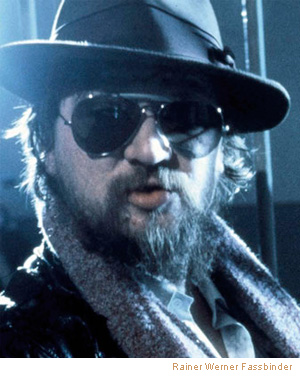
Chapter Seven.
That all these notions and commentaries stick out from the story is the legacy not just of Döblin’s literary lineage but Fassbinder’s “anti-theater” beginnings. Fassbinder wants the viewer to snag on the ideas as the story flows past — much like Brecht, whose influence on Fassbinder is traceable at least as far back as the canned gunshots and actors clutching invisible wounds in Love Is Colder Than Death, a gangster deconstruction Fassbinder wrote and directed as a twenty-three-year-old.
Chapter Eight.
This being a Fassbinder review that’s just invoked Brecht, the jaded reader is likely counting down the seconds until the reviewer mentions Fassbinder’s other major influence, Douglas Sirk. Fassbinder, in his writing on Sirk, identified the German-born Hollywood melodramatist’s outsized aesthetics, that Technicolor swoon, as a vehicle for emotional sensitivity. Berlin Alexanderplatz upends that schema: cinematographer Xaver Schwarzenberger’s palette is sepia-soaked, not faded-photograph tint but outright brown murk, less nostalgic than miasmic. The occasional moments of Sirkian flourish — the neon signs blinking through windows and bathing the faces of the actors in hot pinks and electric blues — come off as ironic, the joke of transcendence in a world of sludge.
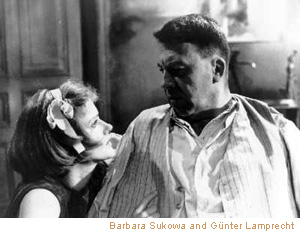
Chapter Nine.
Berlin Alexanderplatz was originally even sludgier. Its debut broadcast drew protests over the picture quality, which was at times nearly unintelligible. Schwarzenberger, who supervised the restoration along with Lorenz, has said that the improved image quality is merely a question of improved technology, and thus in line with Fassbinder’s intentions. Still, the “cleaning up” of any part of Fassbinder’s capital-L Legacy is a touchy subject at the moment. A rift has developed between Fassbinder’s colleagues and Lorenz, who was the filmmaker’s wife (quite possibly in name only) in the last years of his life, and who now heads the Fassbinder Foundation. Lorenz is accused of attempting to “sanitize Fassbinder’s life along middle-class, petit bourgeois lines,” per a recent Film Comment dispatch by the German critic Katja Nicodemus. Weighing the charges and rebuttals, though, one mostly wonders about the extent to which Fassbinder’s life and work can actually be manipulated.
Chapter Ten.
Watching a Fassbinder movie is a bit like walking into a Thai restaurant decorated within an inch of its life — prints and paintings hanging on the walls between shelves of figurines, potted plants and small fountains in the corners of the room, standing screens between booths, mismatched lamps on every table — and then gradually realizing that every single thing in the place has a price tag on it, even the chair you’re sitting on, and probably the pot your meal was cooked in, if you ask. Fassbinder’s social cosmos is frankly, brutally transactional. Which is to say: no matter who its executor, Berlin Alexanderplatz is still a work in which a man forces himself on a woman in her own kitchen, then returns the next day to give her a new apron in exchange for the one he ripped. (She accepts it gratefully). Penance for wrongdoing, or payment for services rendered? For Fassbinder, there isn’t necessarily a difference.
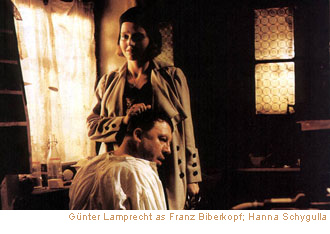
Chapter Eleven.
Even Biberkopf’s great white-clad hope, Mieze (Barbara Sukowa) — who arrives at his lowest moment to offer him her childlike affection — moonlights as a prostitute. Her tragic fate isn’t the despoiling of innocence: despite appearances, her parceled-out backstory reveals “innocence” as a state she shed long ago.
Yet she is still the redemptive pole of Biberkopf’s existence, waging (whether she knows it or not) a Manichean battle for his soul with his best friend, Reinhold (Gottfried John). A stammering, weak-willed misogynist and petty criminal who first appears in the episode entitled “A Reaper with the Power of Our Lord,” Reinhold stands in for everything Biberkopf must keep out; Biberkopf’s unexplainable attraction to him (not precisely sexual, though there are intimations) represents his susceptibility to self-destructive impulses.
Chapter Twelve.
(One particular genius of Berlin Alexanderplatz is that Reinhold doesn’t appear until nearly five hours in, and Mieze until about the halfway mark, each supplanting prior best friends and love interests. Like life, this saga is simultaneously discontinuous and repetitive.)
Chapter Thirteen.
TV is a medium for close-ups, and Fassbinder zooms in on John’s and Sukowa’s respectively sunken and beatific faces for their iconic currency. (Criterion’s packaging emphasizes this too, replicating the standard TV-on-DVD practice of emblazoning a different cast member’s face on each disc.) The visual grammar is small-screen: the longer takes tend to be blocked stagily, for a stationary camera; when the camera does move, the emphasis is on constriction, on the poles and beams it circles or the bars within the frame. The performances are scaled accordingly. But Günter Lamprecht, as Biberkopf, expands the frame. His shoulders spanning the screen, his chest bulging the pinstripes of his suit, Lamprecht gives a full-bodied performance as a man fearsomely proficient at satiating his enormous appetites for food, drink and sex. (His signature romantic maneuver is a voracious chomp on the neck of his paramour.) Worldly, but not wise, Biberkopf’s vitality is everything — to his benefit and detriment.
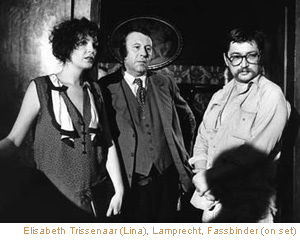
Epilogue.
Berlin Alexanderplatz’s epilogue is a feature-length hallucination, scored anachronistically to Kraftwerk’s future shock and Janis Joplin’s assertion (of Kris Kristofferson’s sentiment) that “freedom is just another word for nothing left to lose.” Feverishly bleeding from rat-infested prisons to cold mental institutions to S&M dungeons, the movie finally finishes Biberkopf off with imagery from a slaughterhouse, the Crucifixion, and nuclear apocalypse. But the real epilogue is included elsewhere on the new Criterion set: little-known German director Phil Jutzi’s 1931 film of Berlin Alexanderplatz, co-written by Döblin. Like Fassbinder’s version, Jutzi’s 90-minute take shows Biberkopf overwhelmed by the world, jagged as it is with the proto-noir mixture of “city symphony”-style documentary realism, expressionist montage, and seedy subject matter typical of the German cinema of the period.
It’s a reminder that Berlin Alexanderplatz begins not with Fassbinder but with the relatively unknown (to the American viewer at least) Döblin. But certain elements, by their absence in Jutzi’s version, are more clearly Fassbinder’s. (Or, “Fassbinder’s.” The opening credits of each episode of Berlin Alexanderplatz announce it as a presentation of Fassbinder, Lamprecht, Schwarzenberger, Lorenz and more, “With major contributions from many others.” Especially given the scope of the project, the co-authorship of the director’s colleagues ought to be acknowledged, even if it can never be quantified.) The atmosphere of religious doom gathering with every invocation of the Whore of Babylon or the grim reaper; the inexorable codependency; the agonizing timing — these are unique to Fassbinder, and few could do them better justice.
And it underscores something that might otherwise be lost in the torrent of Fassbinder’s rendition. National Socialism is mentioned but briefly amid Berlin Alexanderplatz’s 940 minutes (and not at all in Jutzi’s film, released two years after the novel’s publication, and two years before Hitler’s rise). It’s hardly a lack of prescience on Döblin’s part, or of insufficient consideration on Fassbinder’s. The specter of Germany’s eventual fate is everywhere, but political evil seems, after the relentless punishment we see one ordinary man endure, an inevitable afterthought. In Fassbinder’s miniseries, downfall is writ unimaginably large, on the tiniest of canvasses.